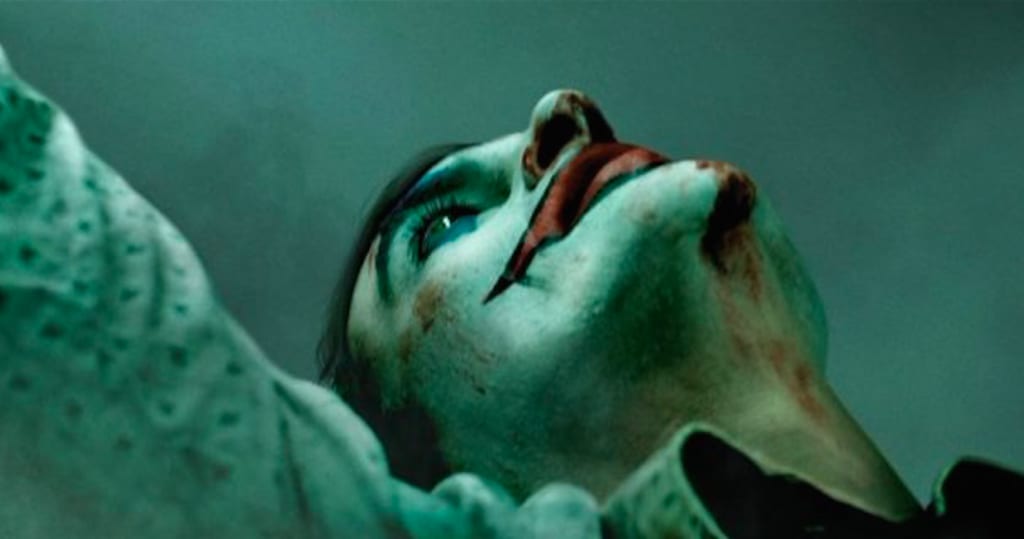Joker 2019 (Todd Phillips) Film Review
by Rachel Knight

"I just hope my death makes more cents than my life”
Todd Phillips’ Joker takes darkness to another level. It can be summarised with the phrase ‘you can be kind to the world, but the world will not be kind back’. A deeply disturbing, bleak and gripping exploration of a broken individual with a complex antihero that leaves viewers seriously questioning their relationship with the ‘protagonist’. We watch Arthur Fleck’s miserable world (full of miserable people) fall apart through a painful series of events that seemingly cannot get any worse until the next comes along. His character develops throughout the film in a unique fashion, ending up even more insane than he was to begin with. Yet it is the consequence of this that provides him with his new identity that he is so pleased with, as he becomes a saint for those similarly outraged and negatively impacted by the system. Arthur subconsciously fuels further rebellion against “fascist” mayor Thomas Wayne following his actions on the Murray show, by which pure anomie is generated.
Despite the film being based in Gotham City, 1981, it is saturated in social and political criticism relevant to contemporary society, from the digs aimed at late-night American TV presenters to shedding light on the growing opposition to the politically right. After all, this film displays the creation of a psychopath as a product of social inequality, quite obviously opening gateways for controversy. Joker unleashes his concealed anger felt towards his society on the Murray show, exclaiming that it “treats him like trash” and that “everyone is awful these days”. The side-profile shots of Joker in this scene are incredibly intense, he is almost twitching in anticipation for his big moment, and so are the audience. Interestingly, alongside these criticisms subtle parallels can be drawn from the rioting that becomes prominent towards the end of the film and those currently occurring in Hong Kong, even coincidentally through the masks worn by protesters. We see Thomas Wayne’s comments on the working class backfire as Joker can escape his defeat by blending into the clown-masked rioters. Being so entrenched in political criticism, Joker’s narrative uses Arthur’s unfolding tragedies to launch its relatively socialist message in an extremely hyperbolic manner. The film is transformed into a hard-hitting political statement, an artistic examination of current problematic governmental systems.
From the chilling cackle to his sudden outbreaks of dance, Joker would not be such a success without Joaquin Phoenix’s phenomenal portrayal of Arthur’s descent into total insanity (in other words, the birth of ‘Joker’), doing the comic book character justice and creating a legacy achieved previously by Heath Ledger. Phoenix himself described Joker as a character that is “not easy to define”, “complex” and “challenging” which is evident for audiences. Phoenix also had to lose weight to fulfil this role despite being opposed to the idea, but most would agree that his alarming physique in Joker ultimately pays off in enhancing the physical and emotional turmoil of Arthur. His acting indoctrinates the audience into the mindset of the villain, so intensely that we become almost immune to his ludicrous violence.
As well as the films stunning visuals with effective use of colour, striking cinematography and atmospheric set designs, the soundtrack of Joker must not be put aside. Hildur Guðnadóttir’s haunting composition fits perfectly with this film, despite Phillips’ claim that she was amazingly “writing before [Joker was] even shot”. We hear her score at its highest impact as Joker pulls his lips up into a bloody grin, reflecting his troubled smile in the opening that has been transformed into a symbol of his inner contentment. Other musical pieces used in Joker are just as effective, including Cream’s ‘White Room’ that is effortlessly stylish in accompanying the crashing cars and escalating “beautiful” chaos in Gotham city, as described by Joker. At this point he gazes out of the police car window, literally on his way to the ‘White Room’, with complete and honest joy – something that is rare to observe in this astonishingly melancholic film.
The genius of Todd Phillips’ Joker lies in its blurred boundary between reality and delusion, and his ability to interweave references to the origin story without stripping his own work of originality. If you look harder at this film, you will find yourself uncovering more and more layers, unanswered questions and ambiguity. Joker has already begun its journey of going down as a masterpiece in film history.





Comments
There are no comments for this story
Be the first to respond and start the conversation.